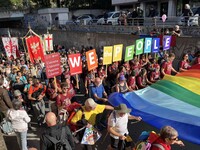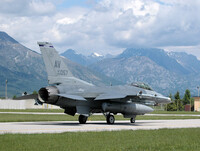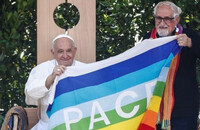Il Fbi spia e scheda i dimostranti pacifisti
La rivelazione ha fatto scattare la protesta immediata dei movimenti per i diritti civili che vedono in queste iniziative il pericolo di un ritorno alle pagine buie degli anni ’60 e ’70 quando l’allora capo del Fbi J. Edgar Hoover faceva spiare dai suoi agenti, spesso infiltrati, proteste politiche di ogni tipo: dalla guerra del Vietnam alle marce contro la discriminazione razziale guidate dal reverendo Martin Luther King.
Gli abusi del Fbi nell’era Hoover avevano portato alla approvazione negli anni successivi di una serie di restrizioni nel margine di libertà concessi agli agenti federali. Ma dopo l’11 settembre molte di queste restrizioni sono state allentate per dare agli agenti più spazio di manovra nelle indagini contro il terrorismo.
Ma un memorandum distribuito alcuni giorni fa dal Fbi alle polizie locali, chiedendone la collaborazione nella sorveglianza e nel reperimento di informazioni sui partecipanti alle manifestazioni contro la guerra in Iraq, sembra avere reso invisibile la separazione finora esistente tra attività pacifiste e sospette attività terroriste.
Nel memorandum si chiede aiuto nell’identificare gli anarchici e «gli elementi estremisti» che partecipano alle proteste e nel denunciare qualsiasi attività criminale ai reparti anti-terrorismo del Fbi.
«Fbi ha pericolosamente preso di mira cittadini americani impegnati nell’esercizio del loro diritto al dissenso e alla protesta - afferma Anthony Romero, direttore esecutivo dell’ American Civil Liberties Union (Aclu), la maggiore organizzazione per la difesa dei diritti civili -. La linea divisoria tra terrorismo e legittima disobbedienza civile viene cancellata e sono molto preoccupato per un possibile ritorno ai giorni neri di Hoover».
Ma l’agenzia federale respinge l’accusa. «Sappiamo che tra i partecipanti a queste manifestazioni vi sono individui capaci di violenza - ha spiegato un funzionario del Fbi -. Sappiamo inoltre che questi vasti assembramenti possono costituire un bersaglio invitante per i gruppi terroristi. A questo punto sarebbe criminale non adottare le necessarie contromisure».
Il memorandum del Fbi alle polizie locali sottolinea l’uso da parte dei dimostranti contro la guerra di «campi di addestramento per provare le tattiche e le contro-strategie nei confronti delle forze dell’ordine».
Viene messo in evidenza anche l’ampio uso fatto dai dimostranti di Internet «per reclutare, raccogliere fondi e coordinare le attività prima delle dimostrazioni».
Attivisti per i diritti civili hanno accusato le polizie locali e gli agenti federali di diverse città americane (come Denver e Fresno) di avere svolto attività di spionaggio delle dimostrazioni anti-guerra in Iraq e di avere tentato anche di infiltrarsi nella manifestazioni. La polizia di New York avrebbe interrogato in modo insistente i partecipanti ad una dimostrazione sulle loro affiliazioni politiche.
Il quotidiano “New York Times”, che si occupa oggi della vicenda, sottolinea che il memorandum del Fbi offre la prima conferma di una operazione «coordinata e su tutto il territorio nazionale da parte del Fbi, per raccogliere intelligence sulle dimostrazioni».
Gazzetta del Mezzogiorno 24/11/03
-------------- Altra fonte ------------------
Reuters 23 Nov 2003 11:47
--- Fbi studia e spia movimenti pacifisti, dice New York Times ---
NEW YORK (Reuters) - Il Federal Bureau of Investigation, più noto come Fbi, ha raccolto informazioni su tattiche, preparazioni e addestramenti dei dimostranti pacifisti.
E' quanto ha scritto oggi il New York Times, sull'edizione domenicale.
In un servizio corredato da diverse interviste e da un pro memoria segreto dell'ufficio, il Times ha scritto che l'Fbi ha anche detto agli esponenti delle polizie locali che avrebbero dovuto riferire alle squadre antiterrorismo ogni attività sospetta rilevata durante le proteste.
Il pro memoria, diffuso alle forze di pubblica sicurezza locali lo scorso 15 ottobre in occasione delle manifestazioni contro la guerra a Washington e San Francisco, spiega in particolare come i contestatori abbiano talvolta adottato dei campi di addestramento per prepararsi, Internet per raccogliere fondi e maschere antigas per proteggersi dai gas lacrimogeni della polizia, dice ancora il giornale.
Il documento analizza attività legali quali il reclutamento di dimostranti, così come quelle illegali, come utilizzare documenti falsi per aver accesso a luoghi riservati, dice ancora il quotidiano.
Funzionari dell'Fbi hanno detto al giornale che l'attività investigativa mira a identificare anarchici ed esponenti estremisti che progettano azioni violente, non a monitorare i discorsi politici di contestatori insofferenti nei confronti della legge.
Interpellato a proposito del servizio, un portavoce dell'Fbi ha riferito che l'agenzia si interessa dell'attività di potenziali criminali, così come di possibili terroristi.
"L'Fbi non s'interessa di individui che esercitano il loro diritto costituzionale a protestare", ha detto il portavoce dell'Fbi Bill Carter. "Sono solo i gruppi che potrebbero essere coinvolti in azioni violente o criminali che ci potrebbero interessare".
PREOCCUPATI I GRUPPI PER I DIRITTI CIVILI
Ma gruppi per i diritti civili ed esperti di Diritto hanno detto al Times che il programma di monitoraggio potrebbe segnare un ritorno agli abusi perpetrati negli anni Sessanta e Settanta, quando J. Edgar Hoover era direttore dell'Fbi e gli agenti spiavano di routine gli esponenti della contestazione politica, compreso Martin Luther King Jr.
"L'Fbi sta pericolosamente prendendo di mira americani impegnati in nulla più che proteste e dissensi legittimi", ha detto al giornale Anthony Romero, direttore di American Civil Liberties Union. "La linea di demarcazione tra terrorismo e legittima disobbedienza civile è labile e mi preoccupa seriamente che si possa tornare ai tempi di Hoover".
Gli abusi commessi da Hoover ed altri all'epoca portarono a delle restrizioni sulle indagini dell'Fbi sugli attivisti politici. Restrizioni che sono state significativamente allentate quando il ministro della Giustizia John Ashcroft, citando gli attentati dell'11 settembre, ha rilasciato delle linee guida che consentono agli agenti l'accesso a raduni politici, moschee ed altri eventi pubblici.
Fonte web: http://www.reuters.com/locales/newsArticle.jsp?type=entertainmentNews&locale=it_IT&storyID=3876988
---- Altra fonte
Dal sito dell'American Civil Liberties Union (ACLU)
ACLU Slams Classified FBI Memorandum Directing Law Enforcement to Engage in Protest Suppression Tactics
November 23, 2003
FOR IMMEDIATE RELEASE
Contact: media@dcaclu.org
WASHINGTON - The American Civil Liberties Union today denounced a classified FBI intelligence memorandum, obtained by the New York Times, which gives police detailed instructions on how to target and monitor lawful political demonstrations under the rubric of fighting terrorism.
“Attorney General Ashcroft has dismissed critics of the Justice Department’s tactics as 'hysterical' and has even said that such criticism aids the terrorists,” said Anthony D. Romero, ACLU Executive Director. “But this bulletin confirms that the federal government is targeting innocent Americans engaged in nothing more than lawful protest and dissent. The American people deserve an explanation for what is clearly a return to the days of J. Edgar Hoover’s spying tactics.”
According to a front-page story in today’s New York Times, the memorandum was circulated last month to local law enforcement agencies around the country in advance of mass marches and rallies in Washington, DC and San Francisco against the U.S. occupation in Iraq.
The memorandum, the Times reports, details how protesters have sometimes used “training camps” to rehearse for demonstrations, the Internet to raise money and gas masks to defend against tear gas. It describes lawful activities like recruiting demonstrators, as well as illegal activities like using fake documentation to get into a secured site.
“It is troubling that the FBI is advocating spying on peaceful protesters, but even protesters who engage in civil disobedience or other disruptive acts should not be treated like potential terrorists,” Romero said.
Of particular concern is one section warning law enforcement about protesters’ use of videotaping as an “intimidation” technique. Most mainstream demonstrators often use videotape during protests to document law enforcement activity and, more importantly, deter police from acting outside the law.
Citing no specific intelligence of suspected unlawful activity by the protesters, the memorandum describes, in detail, protest tactics and strategies that should be tracked by law enforcement officials including the FBI Joint Terrorism Task Forces (JTTF).
While saying that the FBI possesses no information about any planned unlawful activity, the bulletin urges local law enforcement “to be alert to these possible indicators of protest activity and report any potentially illegal acts” to federal authorities.
Importantly, the ACLU said that it had already seen proof that peaceful activities were being monitored by the JTTF. Documents recently obtained by the ACLU of Colorado as part of its “Spy Files” lawsuit against Denver police confirmed that the local JTTF has been collecting information about peaceful protest activities that have nothing to do with terrorism or any other criminal activity.
News of the classified bulletin also comes on the heels of an ACLU lawsuit against the Secret Service for the continuing practice of allowing pro-Bush protesters to remain visible to cameras during presidential appearances, and corralling anti-Bush protesters into pens or designated areas far from the media
Fonte web: http://www.aclu.org/SafeandFree/SafeandFree.cfm?ID=14450&c=206
---- Altra fonte
Why War?
http://www.why-war.com
FBI Scrutinizes Anti-War Rallies
Eric Lichtblau | New York Times | November 23, 2003
"The abuses of the Hoover era, which included efforts by the F.B.I. to harass and discredit Hoover's political enemies under a program known as Cointelpro, led to tight restrictions on F.B.I. investigations of political activities. Those restrictions were relaxed significantly last year, when Attorney General John Ashcroft issued guidelines giving agents authority to attend political rallies, mosques and any event 'open to the public.' "
The Federal Bureau of Investigation has collected extensive information on the tactics, training and organization of antiwar demonstrators and has advised local law enforcement officials to report any suspicious activity at protests to its counterterrorism squads, according to interviews and a confidential bureau memorandum.
The memorandum, which the bureau sent to local law enforcement agencies last month in advance of antiwar demonstrations in Washington and San Francisco, detailed how protesters have sometimes used "training camps" to rehearse for demonstrations, the Internet to raise money and gas masks to defend against tear gas. The memorandum analyzed lawful activities like recruiting demonstrators, as well as illegal activities like using fake documentation to get into a secured site.
F.B.I. officials said in interviews that the intelligence-gathering effort was aimed at identifying anarchists and "extremist elements" plotting violence, not at monitoring the political speech of law-abiding protesters.
The initiative has won the support of some local police, who view it as a critical way to maintain order at large-scale demonstrations. Indeed, some law enforcement officials said they believed the F.B.I.'s approach had helped to ensure that nationwide antiwar demonstrations in recent months, drawing hundreds of thousands of protesters, remained largely free of violence and disruption.
But some civil rights advocates and legal scholars said the monitoring program could signal a return to the abuses of the 1960's and 1970's, when J. Edgar Hoover was the F.B.I. director and agents routinely spied on political protesters like the Rev. Dr. Martin Luther King Jr.
"The F.B.I. is dangerously targeting Americans who are engaged in nothing more than lawful protest and dissent," said Anthony Romero, executive director of the American Civil Liberties Union. "The line between terrorism and legitimate civil disobedience is blurred, and I have a serious concern about whether we're going back to the days of Hoover."
Herman Schwartz, a constitutional law professor at American University who has written about F.B.I. history, said collecting intelligence at demonstrations is probably legal.
But he added: "As a matter of principle, it has a very serious chilling effect on peaceful demonstration. If you go around telling people, 'We're going to ferret out information on demonstrations,' that deters people. People don't want their names and pictures in F.B.I. files."
The abuses of the Hoover era, which included efforts by the F.B.I. to harass and discredit Hoover's political enemies under a program known as Cointelpro, led to tight restrictions on F.B.I. investigations of political activities.
Those restrictions were relaxed significantly last year, when Attorney General John Ashcroft issued guidelines giving agents authority to attend political rallies, mosques and any event "open to the public."
Mr. Ashcroft said the Sept. 11 attacks made it essential that the F.B.I. be allowed to investigate terrorism more aggressively. The bureau's recent strategy in policing demonstrations is an outgrowth of that policy, officials said.
"We're not concerned with individuals who are exercising their constitutional rights," one F.B.I. official said. "But it's obvious that there are individuals capable of violence at these events. We know that there are anarchists that are actively involved in trying to sabotage and commit acts of violence at these different events, and we also know that these large gatherings would be a prime target for terrorist groups."
Civil rights advocates, relying largely on anecdotal evidence, have complained for months that federal officials have surreptitiously sought to suppress the First Amendment rights of antiwar demonstrators.
Critics of the Bush administration's Iraq policy, for instance, have sued the government to learn how their names ended up on a "no fly" list used to stop suspected terrorists from boarding planes. Civil rights advocates have accused federal and local authorities in Denver and Fresno, Calif., of spying on antiwar demonstrators or infiltrating planning meetings. And the New York Police Department this year questioned many of those arrested at demonstrations about their political affiliations, before halting the practice and expunging the data in the face of public criticism.
The F.B.I. memorandum, however, appears to offer the first corroboration of a coordinated, nationwide effort to collect intelligence regarding demonstrations.
The memorandum, circulated on Oct. 15 — just 10 days before many thousands gathered in Washington and San Francisco to protest the American occupation of Iraq — noted that the bureau "possesses no information indicating that violent or terrorist activities are being planned as part of these protests" and that "most protests are peaceful events."
But it pointed to violence at protests against the International Monetary Fund and the World Bank as evidence of potential disruption. Law enforcement officials said in interviews that they had become particularly concerned about the ability of antigovernment groups to exploit demonstrations and promote a violent agenda.
"What a great opportunity for an act of terrorism, when all your resources are dedicated to some big event and you let your guard down," a law enforcement official involved in securing recent demonstrations said. "What would the public say if we didn't look for criminal activity and intelligence at these events?"
The memorandum urged local law enforcement officials "to be alert to these possible indicators of protest activity and report any potentially illegal acts" to counterterrorism task forces run by the F.B.I. It warned about an array of threats, including homemade bombs and the formation of human chains.
The memorandum discussed demonstrators' "innovative strategies," like the videotaping of arrests as a means of "intimidation" against the police. And it noted that protesters "often use the Internet to recruit, raise funds and coordinate their activities prior to demonstrations."
"Activists may also make use of training camps to rehearse tactics and counter-strategies for dealing with the police and to resolve any logistical issues," the memorandum continued. It also noted that protesters may raise money to help pay for lawyers for those arrested.
F.B.I. counterterrorism officials developed the intelligence cited in the memorandum through firsthand observation, informants, public sources like the Internet and other methods, officials said.
Officials said the F.B.I. treats demonstrations no differently than other large-scale and vulnerable gatherings. The aim, they said, was not to monitor protesters but to gather intelligence.
Critics said they remained worried. "What the F.B.I. regards as potential terrorism," Mr. Romero of the A.C.L.U. said, "strikes me as civil disobedience."
Fonte: http://www.why-war.com/news/2003/11/23/fbiscrut.html
Per approfondimenti: http://www.refuseandresist.org/police_state/art.php?aid=730
Altra Fonte: www.nytimes.com/2003/11/23/national/23FBI.html
http://italy.peacelink.org/mediawatch/articles/art_3456.html
Articoli correlati
 La marcia Perugia Assisi
La marcia Perugia AssisiIl popolo della pace
Domenica è stato davvero uno spettacolo vedere quasi 200 mila persone. Un arcobaleno di bandiere che a migliaia sventolavano lungo i 24 chilometri della Marcia. Ancora una volta da Assisi si è levata una voce forte: la pace è questione quotidiana di scelte quotidiane che coinvolgono tutti e tutte.14 ottobre 2025 - Sesto per la pace Fino a quattro anni fa persino il nome “Steadfast Noon” era classificato segreto
Fino a quattro anni fa persino il nome “Steadfast Noon” era classificato segretoOggi comincia la simulazione dell'apocalisse nucleare
Il silenzio delle istituzioni italiane è assordante benché essa riguardi l’evento più catastrofico immaginabile per la sopravvivenza dell’umanità. Ossia la simulazione della Nato alla guerra nucleare. Per questo motivo PeaceLink ha inviato un messaggio ufficiale alle Commissioni Difesa.13 ottobre 2025 - Alessandro Marescotti Il 13 ottobre parte l'esercitazione nucleare NATO Steadfast Noon
Il 13 ottobre parte l'esercitazione nucleare NATO Steadfast NoonOggi si marcia per la pace ma domani sarà simulata la guerra nucleare
Mentre tantissimi pacifisti marciano da Perugia ad Assisi, si scaldano i motori di 71 jet che saranno impegnati a simulare scenari di guerra ad "alta intensità", compresi quelli che prevedono l’uso di armi nucleari. Ecco perché la marcia di oggi assume un valore ancora più grande e attuale.12 ottobre 2025 - Redazione PeaceLink Con l'enciclica Laudato si’ ha dato voce anche al pensiero ecologista
Con l'enciclica Laudato si’ ha dato voce anche al pensiero ecologistaL'eredità che papa Francesco lascia al movimento per la pace
Ricordiamo Papa Francesco, insieme a padre Alex Zanotelli, entrambi nell'Arena di Verona, che sorridono mentre reggono la bandiera della pace. Non è solo una foto. È un'eredità. A noi pacifisti il compito di raccoglierla, custodirla e farla vivere ancora.21 aprile 2025 - Alessandro Marescotti
Sociale.network